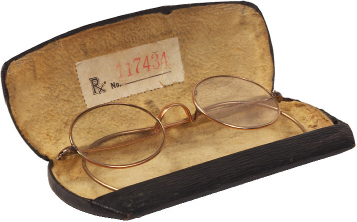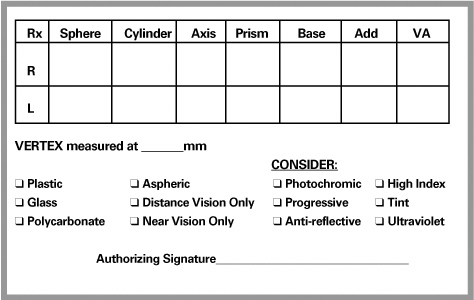Though patients come to the ophthalmologist with a variety of problems or complaints, the most important component by which they measure the success of the ophthalmic treatment is usually their vision with the glasses they're prescribed. I believe that the refraction, the spectacles and their details are often neglected by ophthalmologists who prefer to focus on more "exciting" medical or surgical conditions.
Glasses Remain Important
We know that a good number of patients who undergo cataract or refractive surgery often need to wear spectacles, commonly for close-work and night driving. Others wear glasses alone or as an alternative to their contact lenses. In any case, none of our efforts are of benefit to the patient unless she's happy with her best-corrected vision. For this reason, I invite ophthalmologists to re-examine their role in dispensing. In my mind, this role is primarily to guide the patient, to make her aware of some of the options in frames and lenses and to make recommendations as necessary.
 |
Dr. Pusateri says that he's determined to improve patient education in his own dispensary and send as many of his patients there as possible for their eyeglasses. "Just like the outcome of refractive or cataract surgery, we should pay as much attention or be as much involved with the outcome and satisfaction of our patients' eyeglasses or contact lenses," he says. "It is important for ophthalmologists to be able to control the quality of our work and guarantee the satisfaction of our patients. The secondary result is growth of the practice."
Learn About the Options
In order to provide the necessary guidance, we have to learn what is available in frame and lens technology, and then use this knowledge to make suggestions to the patient. I've found that many people have not heard of progressive lenses, anti-reflective coatings, high-index lenses or polycarbonate lenses. Of course, attendance at the optical shows and attention to the dispensing publications are good ways to educate ourselves about the options in eyewear. But I've found the easiest way to learn is to spend 15 minutes with your optician. Meet regularly, and ask her to update you on what's new in the industry and what patients are asking her about, so that you can be just as well informed.
Dr. Pusateri acknowledges that it's difficult to keep up with the extensive changes in optical technology. He says that sometimes patients are more informed about new products than the ophthalmologist is. The MD who is not up-to-speed on optical products is missing opportunities for patient education, he says. "When I entered practice, some of my patients knew more about spectacles or contact lenses than I did, yet I was supposed to be the expert," says Dr. Pusateri. "With the Internet and other sources of information the patient will be able to tell when an ophthalmologist is at the top of his game or falling behind. It's essential that ophthalmologists give the most accurate, up-to-date advice about optical, just as they would for refractive surgery, cataract surgery or glaucoma care. Is it fair to our patients not to learn dispensing?"
Write it Down
Patients come to us for care and guidance in eye conditions. This includes a desire for guidance in eyeglasses. Making recommendations on lenses and frames will help the patient, show you care and provide the information that your optician needs. After drawing some conclusions about what you think is best for the patient, share them with her, and write them down on the prescription. I use a customized prescription blank (see below) that has check-off options for lens material, tint, coatings, etc. Ideally, you could then walk the patient to the dispensary, show the Rx to the optician and pass her off into the optician's care.
 |
Of course, not all patients will purchase their glasses from your dispensary, and this makes your written suggestions even more important. For example, if a monocular patient needs polycarbonate lenses, you are responsible for noting this in the chart and on the prescription blank for an outside optician to fill.
Since our patients come to us initially for vision evaluation or improvement, I believe we have a moral, medico-legal and economic interest in pointing them in the right direction with regard to eyewear.
Dr. Weinstock practices at Canton Ophthalmology Associates, Inc. and is a professor of ophthalmology at Northeastern Ohio Universities College of Medicine. Call him at (330) 456-0047.






